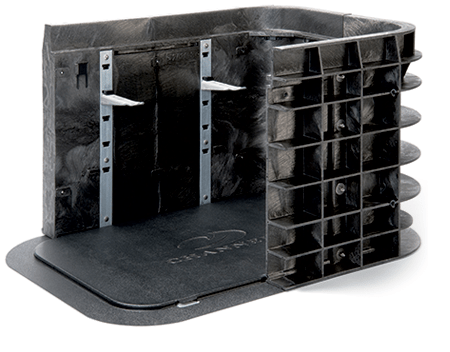November 27, 2015
Email Print

Channell Commercial Corp. Channell Commercial Corp. makes plastic vaults that house underground utility connections.
Channell Commercial Corp., a manufacturer of molded plastic boxes that house underground utility connections, has resolved a patent dispute with PenCell Plastics Inc., PenCell’s parent company, Hubbell Inc., and its business unit Hubbell Power Systems Inc.
Although the exact settlement terms are confidential, Channell, which is based in Delaware but does business in Temecula, Calif., received an upfront payment and ongoing royalties for the life of the two patents at issue, according to a statement from the company.
Founded in 1922, Channell is a family owned business that was seeking a multi-million award in a trial set for April 2016.
The patents at issue relate to the structural design of the walls of the boxes, which are made of high density polyethylene, and their removable cover plates with pedestal housings. The boxes, also called vaults, are installed at grade level in sidewalks, alleys and driveways to enclose buried electrical connections for cable TV, optical fibers, water meters, signal lights, and data transmission lines. The boxes protect the wiring from weather, vandalism and tampering. The split-cover lids serve as access points.
The patents have effective filing dates in March 2005 and were published in June 2008 with claims that compared to prior enclosure systems, the inventions simplify utility installation, servicing and upgrading, which reduces time and labor costs.
The lawsuit was filed in March 2014. It says Channell and PenCell, which is based in New Jersey and does business in Rocky Mount, N.C., were in talks about a potential business relationship back in 2005, and Channell shared information about its manufacturing specifications and designs for enclosures related to the patents.
When Channell introduced an HDPE box based on one of the patents, industry skeptics questioned whether the light-weight material could withstand the vertical loads, the lawsuit says. However, in 2012, it continues, Channell proved its gridded wall design — a feature covered by the patent — could handle loads like pedestrian and vehicular traffic. The grid is a “polymeric material” with vertical ribs to enhance compression strength and horizontal ribs to resist side wall deflection. Channell won a major contract with a leading consumer of grade-level utility enclosures.
In late 2013, Hubbell Inc., a $ 3.3 billion publicly traded company based in Shelton, Conn., made an overture to buy Channell.
Hubbell then bought PenCell in early 2014 for $ 30.1 million and added it to its power systems segment, which is based in Delaware, according to a U.S. Securities and Exchange Commission filing. According to the lawsuit, PenCell and Hubbell then worked together to manufacture and sell infringing utility enclosures. A major customer declined to renew its contract with Channell and now buys from PenCell and Hubbell, according to the suit.
The lawsuit also says in November 2013, Channell bid on a substantial contract to provide its enclosures to a customer in the telecommunications industry but PenCell got the contract by “significantly undercutting” Channell on price.
Channell filed its lawsuit four months later in U.S. District Court in Los Angeles. PenCell responded with a counterclaim, denying infringement “of any valid patent” and asking the court to dismiss the case.
Channell amended its lawsuit in March 2015, further alleging that the defendants increased their illegal activities by entering into a strategic partnership to manufacture infringing products for Clearfield Inc., a Minneapolis-based business that Channell had previously provided with products.
Clearfield displayed the products in question at the Cable-Tec Expo in September 2014, according to the lawsuit. Channell also pointed to Clearfield’s marketing literature, saying that descriptions like “high quality HDPE waffle-designed body distributes load evenly across sidewalls” emphasized patented features.
The case was headed for a jury trial. Channell was seeking a court order to ban the defendants from making, using, selling, or taking any action that would directly or indirectly infringe on the patents. The company also was asking for monetary damages based on an analysis of lost profits. The damages sought were “in no way less than a reasonable royalty.”
The parties settled out of court and the lawsuit was dismissed with prejudice on Nov. 10.
In a statement issued Nov. 17, Channell CEO William Channell, Jr., said both sides are satisfied with the settlement. Hubbell attorney William Bradley of the Washington, D.C., law firm Michael Best & Friedrich LLP declined to comment on that assessment or the case.
“All I can say is that Hubbell does not comment on the specific details of litigation and does not intend to characterize the press release issued by Channell,” Bradley said in a Nov. 24 voice mail message.
Channell referenced his company’s Shutter grade-level box (SGLB) for subsurface thermoplastic enclosures and the Bulk “impervious vault system” in the release.
“Channell is committed to ensuring that it receives fair compensation from those who would infringe its valuable intellectual property rights or copy its forward-thinking designs surrounding our protected SGLB and Bulk bodies,” Channell said. “This is the second patent infringement lawsuit that we have successfully settled, giving strength to our patent portfolio that covers our underground closures and related products. We are pleased the lawsuit has been settled to both parties’ satisfaction.”
The company says it has at least 23 U.S. patents in its name. Channell designs and manufactures a wide range of products for customers worldwide. Product lines include thermoplastic and metal grade-level utility enclosures, connectors, fiber-optic cable management systems, and polyethylene water storage tanks.





























